revolutionary reads community read
It's Free and for Everyone
Each year through 2026, a book is chosen that gives audiences a reconsideration of the iconic events leading up to the America Revolution against the British Empire. The American colonists’ breakup with the British Empire was the culmination of a series of escalating events and politics over a ten year period. Each author shares different perspectives of the people living in the colonies leading up to the 1776 signing of the Declaration of Independence.
Book selections:
Each year through 2026, a book is chosen that gives audiences a reconsideration of the iconic events leading up to the America Revolution against the British Empire. The American colonists’ breakup with the British Empire was the culmination of a series of escalating events and politics over a ten year period. Each author shares different perspectives of the people living in the colonies leading up to the 1776 signing of the Declaration of Independence.
Book selections:
- 2025 Revolutionary Read - The Painter's Fire: A Forgotten History of the Artists Who Championed the American Revolution by Zara Anishanslin
- 2024 Revolutionary Read - '1774: The Long Year of Revolution' by Mary Beth Norton
- 2023 Revolutionary Read - 'Frontier Rebels: The Fight for Independence in the American West, 1765-1776' by Patrick Spero.
- 2022 Revolutionary Read - 'The Boston Massacre: A Family History' by Serena Zabin.
2025 revolutionary read
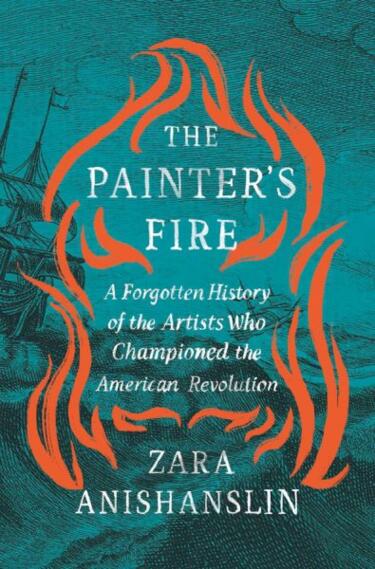

Told through the lives of three remarkable artists devoted to the pursuit of liberty, an illuminating new history of the ideals that fired the American Revolution.
The war that we now call the American Revolution was not only fought in the colonies with muskets and bayonets. On both sides of the Atlantic, artists armed with paint, canvas, and wax played an integral role in forging revolutionary ideals. Zara Anishanslin charts the intertwined lives of three such figures who dared to defy the British monarchy: Robert Edge Pine, Prince Demah, and Patience Wright. From London to Boston, from Jamaica to Paris, from Bath to Philadelphia, these largely forgotten patriots boldly risked their reputations and their lives to declare independence.
Mostly excluded from formal political or military power, these artists and their circles fired salvos against the king on the walls of the Royal Academy as well as on the battlefields of North America. They used their talents to inspire rebellion, define American patriotism, and fashion a new political culture, often alongside more familiar revolutionary figures such as Benjamin Franklin and Phillis Wheatley. Pine, an award-winning British artist rumored to be of African descent, infused massive history paintings with politics and eventually emigrated to the young United States. Demah, the first identifiable enslaved portrait painter in America, was Pine’s pupil in London before self-emancipating and enlisting to fight for the Patriot cause. And Wright, a Long Island–born wax sculptor who became a sensation in London, loudly advocated for revolution while acting as an informal patriot spy.
Illuminating a transatlantic and cosmopolitan world of revolutionary fervor, The Painter’s Fire reveals an extraordinary cohort whose experiences testify to both the promise and the limits of liberty in the founding era.
About the Author
Zara Anishanslin is an associate professor of history and art history at the University of Delaware, where she received her PhD in 2009. In addition to The Painter’s Fire, Dr. Anishanslin is the author of the award-winning book, Portrait of a Woman in Silk: Hidden Histories of the British Atlantic World (Yale University Press, 2016). A champion of the public humanities, she served as Material Culture Consultant for Lin-Manuel Miranda’s history exhibit, “Hamilton! The Exhibition.” Recently, she has also started the “Thing4Things” history podcast.
how to participate
2024 revolutionary read
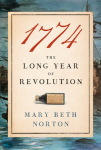
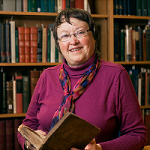
In this masterly work of history, the culmination of more than four decades of research and thought, Mary Beth Norton looks at the sixteen months leading up to the clashes at Lexington and Concord in mid-April 1775. This was the critical, and often overlooked, period when colonists traditionally loyal to King George III began their discordant “discussions” that led them to their acceptance of the inevitability of war against the British Empire.
Drawing extensively on pamphlets, newspapers, and personal correspondence, Norton reconstructs colonial political discourse as it took place throughout 1774. Late in the year, conservatives mounted a vigorous campaign criticizing the First Continental Congress. But by then it was too late.
In early 1775, colonial governors informed officials in London that they were unable to thwart the increasing power of local committees and their allied provincial congresses. Although the Declaration of Independence would not be formally adopted until July 1776, Americans had in effect “declared independence ” even before the outbreak of war in April 1775 by obeying the decrees of the provincial governments they had elected rather than colonial officials appointed by the king. Norton captures the tension and drama of this pivotal year and foundational moment in American history and brings it to life as no other historian has done before.
About the Author
A historian of colonial America who has often focused on the experiences of women, Mary Beth Norton is one of the most respected historians in the United States today. She has published books examining women's experiences during the American Revolution, the Salem Witch Trials, and several popular American history textbooks. In 1997, Founding Mothers & Fathers: Gendered Power and the Forming of American Society was a finalist for the Pulitzer Prize in American History. She served as president of the American Historical Association in 2018. Dr. Norton is the Mary Donlon Alger Professor Emeritus of American History at Cornell University.
2023 revolutionary read
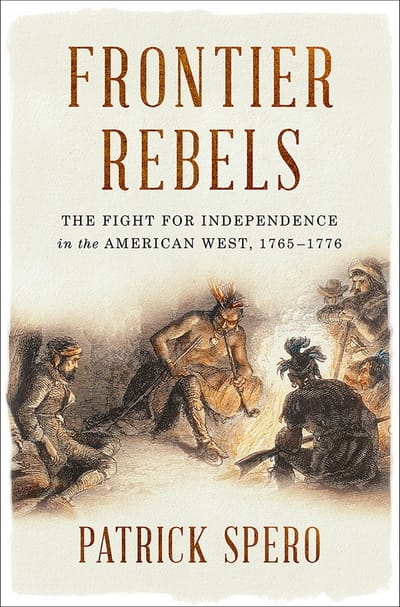
Patrick Spero recasts the familiar narrative of the American Revolution, moving the action from the Eastern Seaboard to the treacherous western frontier, today's Pennsylvania and Ohio. In spellbinding detail, Frontier Rebels reveals an often-overlooked truth: the West played a crucial role in igniting the flame of American independence.
In 1763, the Seven Years’ War ended in a spectacular victory for the British. The French army agreed to leave North America, but many Native Americans, fearing that the British Empire would expand onto their lands and conquer them, refused to lay down their weapons. Under the leadership of a shrewd Ottawa warrior named Pontiac, they kept fighting for their freedom, capturing several British forts and devastating many of the westernmost colonial settlements. The British, battered from the costly war, needed to stop the violent attacks on their borderlands. Peace with Pontiac was their only option—if they could convince him to negotiate.
Enter George Croghan, a wily trader-turned-diplomat with close ties to Native Americans. Under the wary eye of the British commander-in-chief, Croghan organized one of the largest peace offerings ever assembled and began a daring voyage into the interior of North America in search of Pontiac.
Meanwhile, a ragtag group of frontiersmen set about stopping this peace deal in its tracks. Furious at the Empire for capitulating to Native groups, whom they considered their sworn enemies, and suspicious of Croghan’s intentions, these colonists turned Native American tactics of warfare on the British Empire. Dressing as Native Americans and smearing their faces in charcoal, these frontiersmen, known as the Black Boys, launched targeted assaults to destroy Croghan’s peace offering before it could be delivered.
The outcome of these interwoven struggles would determine whose independence would prevail on the American frontier—whether freedom would be defined by the British, Native Americans, or colonial settlers.
Patrick Spero, Ph.D., is the Executive Director of the American Philosophical Society (APS) in Philadelphia. Spero is the author of Frontier Country: The Politics of War in Early Pennsylvania, Frontier Rebels: The Fight for Independence in the American West, and the forthcoming Botany and Betrayal: Andre Michaux, Thomas Jefferson, and the Kentucky Conspiracy of 1793.
2022 revolutionary read
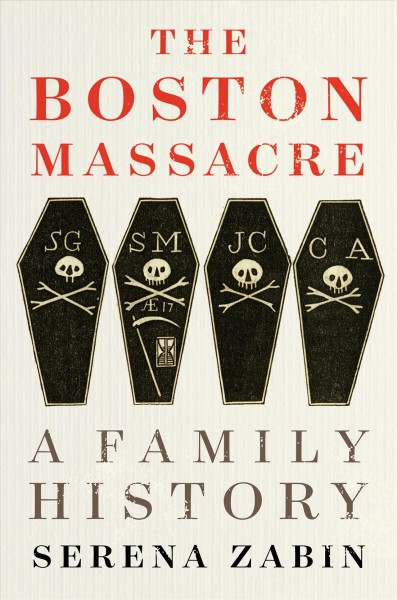
A revelatory new account of the start of the American Revolution.
The story of the Boston Massacre—when on a late winter evening in 1770, British soldiers shot five local men to death—is familiar to generations. But the history of the event has always obscured a fascinating truth: that the Massacre arose from conflicts that were as personal as they were political.
Historian Serena Zabin weaves colorful stories from original sources, following British troops as they make their way from Ireland to Boston in 1768 to subdue the increasingly rebellious colonists. And she reveals a forgotten world hidden in plain sight: the many regimental wives and children who accompanied these armies. We see these families jostling with Bostonians for living space, finding common cause in the search for a lost child, trading barbs and and sharing baptisms – becoming, in other words, neighbors. When soldiers shot unarmed citizens in the street, it was these intensely human, now broken bonds that fueled what quickly became a bitterly fought American Revolution.
Serena Zabin’s The Boston Massacre delivers an indelible new slant on iconic American Revolutionary history.
- Amazon Editor’s Choice for History in 2020
- Journal of the American Revolution Book of the Year Award.
- Named Saturday Evening Post’s 10 Books for the New Year and an Amazon Best Book of February 2020
read more american history
Di you know the Delco Libraries hold 18,365 for resources, books, audio books, and other publications for you to learn about American history?
Check out this SEARCH for other ways to learn about the early days of the American Revolution, biographies, children's books, music, videos and many more stories of our shared American experience.
Need a Library Card? Click here and register online.
Check out this SEARCH for other ways to learn about the early days of the American Revolution, biographies, children's books, music, videos and many more stories of our shared American experience.
Need a Library Card? Click here and register online.
community program partners
The Revolutionary Reads Community Read is presented by Community Program Partners Widener University and Delaware County Libraries and Radnor Historical Society and with support from Visit Delco.
 We're excited to announce that Widener University was awarded a grant from the Philadelphia Funder Collaborative for the Semiquincentennial to support 2025 and 2026 Revolutionary Reads! The Collaborative supports Philadelphia area programs celebrating the 250th anniversary of the founding of our country and we are grateful for their support.
We're excited to announce that Widener University was awarded a grant from the Philadelphia Funder Collaborative for the Semiquincentennial to support 2025 and 2026 Revolutionary Reads! The Collaborative supports Philadelphia area programs celebrating the 250th anniversary of the founding of our country and we are grateful for their support.